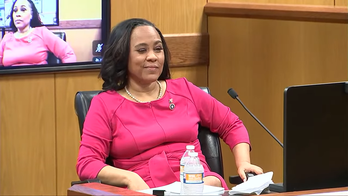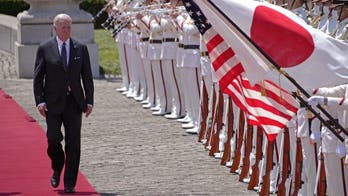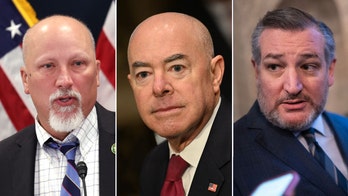
Chris Stirewalt's Power Play is available for a limited time on the America's Election HQ blog. Check back for updates on new subscription offers for app users.
Dems May Warm To Tax Plan, But Cool to Obama; The Truth About Public Opinion; Afghan Review Looming; Damning Wikileaks on Lockerbie Bomber Release; States Scramble As Deficits Mount
----------------------------------------------------------
"This is the public option debate all over again. So I pass a signature piece of legislation where we finally get health care for all Americans, something that Democrats had been fighting for for a hundred years, but because there was a provision in there that they didn't get ... that somehow that was a sign of weakness and compromise."
-- A visibly irritated President Obama answering a reporter's question about where his core principles lie after agreeing to not raise taxes on the wealthy.
Democrats seem to be slowly coming around to the idea that the president's deal with Senate Republicans on the extension of current tax rates is about as good as it's going to get.
But that acceptance, based on the understanding that the deal includes what today's New York Times approvingly calls a "backdoor stimulus plan," was not helped by the president's testy, snappish press conference in defense of the plan.
Obama lashed out at both parties, repeatedly referring to his Republican partners in the deal as "hostage takers," but had special venom for Democratic opponents of the plan, whom he described as "sanctimonious" whose approach would produce "no victories for the American people."
In his second public pronouncement on the deal in as many days, Obama was battered with questions about whether he was a flip-flopper and whether voters could trust his future pronouncements after a stunning reversal from adamantly supporting a tax increase for top earners as a candidate and since taking office.
Despite Obama's tongue lashing, the plan, a two-year, deficit-spending proposal with a price tag estimated at over $700 billion, gained ground as Democrats came to see that the short-term benefits of the package might produce much-needed growth in the upcoming election cycle.
Most on the left already believe that the nearly $60 billion in extended unemployment benefits would be stimulative. But an increasing number of liberal minds say that certainty in tax rates and continuing or expanding current stimulus programs, like a payroll tax holiday, tuition credits and a temporary reprieve from taxes on some capital expenditures, may be worth the price of backing down on the core principle of increasing taxes on "millionaires and billionaires." (Power Play cannot say why anyone with a billion dollars would still be drawing a paycheck, but the world is full of mysteries.)
The gathering conventional wisdom among Democrats is that the plan might jolt the economy out of the doldrums and allow Democrats to make a better case for their brand of governance in 2012. If 2009 saw a big stimulus based on spending, 2011 may see a big stimulus based on tax cuts. It is an unlikely embrace of a mutated version of Reganomics, perhaps, but a 9.8 percent unemployment rate will do strange things to politicians.
While the deal, in some form, might eventually make its way out of Congress before the end of the year (and a blow-up is still eminently possible) the damage done to the president's standing is still very real.
Democrats seemed most wounded by the fact that White House negotiated and announced the deal without much of the input. While Obama cast those concerns as childish in his press conference, to have the House speaker of his own party say that she learned of the deal in the press is a stinging blow.
While his party was in the mood for a final fight with the GOP, to go down swinging one more time. No-Drama Obama cut the play short. He may have been right that doing anything else would just be political posturing, but jumping ahead of his party on such a bedrock issue as taxing the rich has ended in a stumble.
The president will spend much-needed time and political capital on getting the deal done. For example, Vice President Biden, the conciliating brother in law in this domestic dispute, is expected to head to the Hill again today to try to smooth things over.
What Obama will ask of his party in the weeks and months to come will be much more difficult than convincing them to accept the tax deal. On Tuesday, liberal conscience Howard Dean laid out one of the biggest hurdles - tackling the debt.
"We clearly have to deal with the deficit; it is probably the biggest problem facing the country. But you can't deal with the deficit from a political point of view if you say to Democrats, ‘We are going to cut Social Security and Medicare and, by the way, give tax cuts to those who make a million dollars a year,'" Dean told the Huffington Post.
And just next week, Obama will have to begin making the case for extending the U.S. troop surge in Afghanistan. A Democratic president who wants to cut welfare programs but keep taxes on the rich low and fund two wars may find himself alone.
And that's just how Obama seemed Tuesday - alone. Not a triangulator who was cozying up to the conservatives and moderates who clearly do not trust him given the left agenda of his first two years, but a man railing against enemies on all sides.
It is too soon to say whether Obama will face a primary challenge, but he should remember that his own rise was facilitated in large part by disgust among the liberal base of the Democratic Party with the concessions the Clintons made to Republicans.
Bill killed the era of big government, and Hill voted to invade Iraq, and their party punished them for it.
----------------------------------------------------------
"66 percent"
-- The portion of respondents in a new Gallup poll who would support the continuation of the current tax rates for all income levels.
President Obama said several times that he was making his concession on extending the current tax rates despite having the public behind him.
It was particularly revealing that Obama juxtaposed his concessions here with the health care debate, an acknowledgement that he acted against the public will in that matter.
But how real is the support for a tax increase for the rich?
It depends on how you ask the question.
A new Gallup poll finds 66 percent of adults support a continuation of all the current tax rates, identical to the percent who support a continuation of extended unemployment benefits (though presumably not the same 66 percent).
But a Bloomberg poll taken at the same time shows that only 35 percent favor keeping the "lower rates"' for high earners.
To understand how this could be, look at a new survey from Republican firm Public Opinion Strategies taken for the conservative group Crossroads GPS.
In that poll, Voters were 18 points more likely to support continuation of "current tax rates" (83 percent) than they were to favor extending the "tax cuts" (65 percent).
While different phrasing produced different outcomes during the health care debate, it was nothing as sharp as this.
The reasons are probably related to a lack of interest in the fine print on the tax deal. Malleable opinion is often a sign of uninformed opinion. The question for Democrats is where opinion would head if they pushed the debate to the edge.
Given that the tax rates have been in place for eight years and a stalemate would result in a tax increase for all, provoking a showdown looks like a politically risky course.
----------------------------------------------------------
"People are going to put a foot in both camps. They were good at it with the Soviets. They're good at it now."
-- Lt. Col. J.B. Vowell in a security briefing for Defense Secretary Robert Gates in Afghanistan's Kunar province, the site of more than half of all insurgent attacks.
Afghanistan is awash in dignitaries.
Aside from President Obama's surprise visit on Monday, the troubled nation has played host to Defense Secretary Robert Gates and British Prime Minister David Cameron this week.
The occasion is the release next week of the one-year assessment of the Obama troop surge. The White House will release a report on how the 30,000 troops President Obama ordered to the front are affecting the battle.
The early roll out indicates that it will be a finding of a good effort that needs improvement.
On his visit, Cameron, who is leading a budget-slashing crusade in Old Blighty, made it clear that 2011 was the make or break year for his nation's involvement. When our only significant partner in the war says "time to go," it will mean real hardship for U.S. forces and taxpayers.
With a recent spate of allied combat deaths, it looks like U.S. losses in Afghanistan will be close to 500 this year, up from 317 last year. The Brits have lost more than 100 men.
Given the president's aforementioned problems with his own party, his administration's pitch for extending the war effort will meet lots of resistance. A big part of that will center on the man with whom Gates dined today - Afghan President Hamid Karzai.
Given the Wikileaks revelations about corruption and misbehavior in the Karzai regime, the White House will have to do a lot of soft-shoe work to convince lawmakers that the war should go on.
----------------------------------------------------------
"He noted that a refusal of Megrahi's request could have had disastrous implications for British interests in Libya. 'They could have cut us off at the knees,' Fean bluntly said."
-- Leaked diplomatic cable from the U.S. embassy in Tripoli discussing the reaction of British Ambassador to Libya Vincent Fean to the August 2009 release of Lockerbie bomber Abdelbaset al-Megrahi.
Today's Wikileaks scandal is about the release of the Pan Am 103 bomber and what American officials knew about it.
Julian Assange may be cooling his heels in a London jail cell, but the Guardian continues its Wikidumps, this time causing an uproar over the release of the Lybian terrorist who was supposed to be on death's door, but seems to be getting on pretty well 15 months later.
What is very clear in the diplomatic cables is that the previous Labour government in Britain was in negotiations with the Gaddafi regime and that they were trying to avoid reprisals that included attacks and the curtailment of oil leases in the country for BP.
What is also revealed is that despite U.S. avowals that that our government was not involved in the deal, the Brits were keeping the State Department very much in the loop on negotiations.
While the ultimate out on the issue may rest in the responsibility of the Scottish criminal system, the conversations reveal that Gaddafi's threats certainly spurred the involvement of the U.K. and perhaps the U.S.
The murder of 270 innocents, including 190 Americans, is an outrage with no apparent expiration date.
----------------------------------------------------------
"$28.2 billion"
-- The collective shortfall for the 13 states currently running deficits according to a report due out today from National Conference of State Legislatures.
At the halfway point in the fiscal year for 46 states, a collective $28.2 billion shortfall is cause for serious alarm.
Illinois leads the way with a $13 billion budget gap, almost half of its total budget, in a bracing report from the National Conference of State Legislatures. But Arizona, Washington and California are all facing seemingly insurmountable cash shortages.
And while states were able to put off tough choices for two years after a stimulus and a subsequent state bailout package from the feds, next year is shaping up to be a disaster.
February is generally state budget season, and with no signs of another bailout from federal taxpayers, chaos may ensue at statehouse across the land.
In many of those statehouses, Republicans will be ascendant following big midterm gains. While the budget gaps may mean trouble, it may also give conservatives an avenue to implement plans that otherwise wouldn't have gotten a hearing.
Can you say, "privatize?"
And Now, A Word From Charles
"It's utterly inexplicable why the attorney general has not been able to produce an indictment. This is a guy who in July released secrets about Afghanistan in an ongoing war which were even more damaging to American national security. He has had half a year. ... This is most passive, inadequate attorney general I've seen in my lifetime."
-- Charles Krauthammer on "Special Report with Bret Baier" discussing the lack of a U.S. prosecution of Wikileaks founder Julian Assange.




